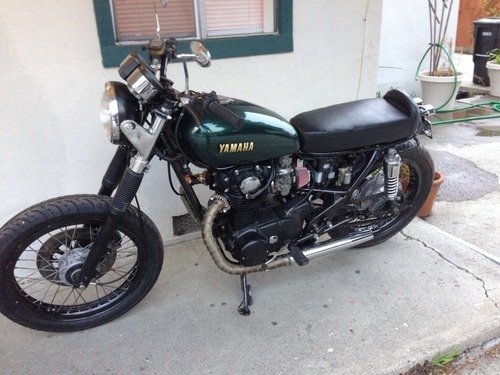Teódolo asked, “May I ask you a question?”
Melón mumbled something and nodded.
Teódolo stood and opened the blinds, avoiding Melón’s gaze. There was neither sun nor sign of calm. The street people beyond the wrought iron gates were trapped in the late afternoon march as they moved past and alongside each other politely and with great efficiency.
“I hope you will forgive me…” He stepped away from the window and faced Melón hesitantly. This was not peculiar behavior to Melón who was used to the tragedy of Teódolo’s face. The crenulations on the surface of his cheeks glistened from sunlight reflected off the surface of the glass table. “I just want to know if I may have a day off tomorrow.”
Melón spit out the wad of banana leaf he held in his mouth and eyed the old man warily. “And why do you need that?”
“My truck transmission is sticking, and I need to take a day to fix it.”
“What? Your truck transmission is bad? Well, I am sorry, Teódolo. I amsorry your miserable pile of rust is not working. You ingrate! You are already off work on Fridays, Saturdays, and Sundays! I pay you to take care of my daughter and that includes tomorrow. Now come here, now. Tell me about her day at school, or I’ll beat your ass.”
“Okay, sorry.” Teódolo rubbed the spot on his nose where the long white hairs grew and wondered about the Brazilian crotch wax before taking a seat on the latticework of the lawnchair and leaning forward, close to Melón’s face. He tried and failed to hide the frown.
“Well, look. Lucinda has been around with some guy who comes from Manchester. His family comes from that African money. Gold, diamonds, that shit.”
“To hell with his family,” said Melón. “What else about him? Is he fucking her?”
“No, no I did not see that. I am with her like chewing gum, boss. I never let her out of my sight.”
“I hope so because if that girl comes in here with a baby, you are the one I am going to beat before I leave you dead in the ocean.”
Teódolo swallowed and nodded obsequiously, his jowls jiggling for attention. He was nervous because he knew Melón would do far worse than what he threatened.
“Do not worry. I guard her as if she is my own daughter.”
Melón chuckled and removed a green handkerchief from the front-left pocket of his bowling shirt. He looked at his reflection in the surface of the table and wiped the banana leaf spittle from the corner of his coarse black stubble.
“You do not give me confidence, Teódolo. I want you to take care of her as if she was my daughter, not one of the bitches from your neighborhood.”
Teódolo swallowed again and nodded. “Yes, boss. With my life.”
Melón knocked on the glass table and shook his head, then stood and walked through the living room to the white door of his bedroom. He left Teódolo sitting in the lawnchair, wondering if the work was worth the price.
He appeared at the front gate of Melón’s house the next morning as he did every day except the three days at the end of the week when Melón himself would take Lucinda to school and then to the shops to make purchases. Melón called it the quality time between a father and daughter and Teódolo wondered both how buying a child more of the same things was quality time and if Lucinda’s behavior around her father was the same as her behavior around Teódolo. She did not seem very mindful of him when he walked several feet behind her in school, and she behaved unsuitably loosely. She would scream and she would cry, and under no circumstances would she show sympathy or compassion for a man such as Teódolo. Her time in class was comprised of using her mobile to type and send messages, then turning to talk to either female friends or boys who could catch her attention. When she walked from class to class, she tried her best to display her chest and rear, far ahead and far behind, respectively, and Teódolo observed that as a result of this behavior, every boy in sight would follow her, sometimes figuratively, sometimes literally. Her female friends would stand beside her and they would discuss the most mundane matters that Teódolo had ever heard. Only when the school day came to an end would Lucinda allow Teódolo to walk close to her as they returned to the Mercedes in the parking lot.
He waited for several minutes before Lucinda strode out of the house in a fury, her dark hair chasing to catch up to her rapidly bobbing head and school uniform, a long pleated skirt and white blouse, rumpled at all angles. Her eyes were concealed by large sunglasses and her right hand gripped a large, red leather handbag that Teódolo had never seen before. She held it so tightly that it began to shake.
“Let’s go!” she screamed, and walked past him into the back seat of the Mercedes. Teódolo nodded and held the door for her until she threw the purse into the corner of the seat and breathed out in exasperation.
“My father! He hates that I have a life!”
“Good morning,” said Teódolo. He rolled her window up as they drove up the tree-lined avenue, passing many other large, typically white, houses, and other large, typically black, cars. The situation was like that of a diplomatic convoy except the cars did not display any nation’s flag.
Teódolo glanced in the rear-view mirror and noticed Lucinda rummaging in her purse. “Did you forget something? Do we need to go back?”
“No, no. Looking for my make-up.”
“I see. Very good.”
Lucinda glanced at herself in the same mirror and proceeded to contort her face, stick out her tongue, and pull down her eyelid.
“Very good? Very good, he says! I am not good, Teódolo! My face is hideous! My father’s constant nagging forced me to leave without applying any make-up at all. I’m a damn pig, look at me.” She brought out a plastic case and began her cosmetic routine.
“You are beautiful, Lucinda. You do not need to worry.”
Lucinda chuckled as she applied the powder to her glistening morning skin. “You think I am beautiful, do you?”
“I am just saying, you do not need to put yourself down.”
Lucinda grinned and moved to the corner of the back seat. “What else do you think of me?”
The question unnerved Teódolo and he avoided speaking until he heard her move and stretch the upholstery. “Never mind. I did not say anything.”
They turned a corner where several merchants were offering roses, counterfeit DVD discs, and cotton candy mounted along long wooden poles. Teódolo was driving too quickly for any of them to approach the car and the noise from their sales pitches quickly passed.
“You know why my father chose you?” asked Lucinda while in the throes of applying mascara aboard a moving vehicle.
“No.”
“Because you’re so ugly that I’d never sleep with you.”
“I see.”
Lucinda sighed and turned to look at the side of street. “You think you’re ugly?”
“I am what I am,” said Teódolo, adding, “I am old.”
“And if I decide to sleep with you one day, what will you do?”
“Do not speak that way, Lucinda. Please, your father.”
“Yes,” she said. “A complete idiot.”
Teódolo sighed and contemplated turning the radio on, but such rudeness had the potential to anger Lucinda, and that in turn had the potential to anger Melón. If Melón was angered severely enough Teódolo would consider leaving the city altogether.
Lucinda was applying lipstick at a stop sign, a rich, carnation red, when she paused and called to Teódolo. He turned his head to the side just as Lucinda leaned forward and sloppily pressed her lips to his mouth. The lipstick smeared onto his lips and the stubble around them.
Lucinda smiled and leaned back. “It looks good on you, don’t remove it. It’s my favorite color. They call it Russian to a Party.”
Teódolo grumbled. After several clumsy wipes some of the waxy red substance found its way into his mouth, and he made a face that amused Lucinda.
“What’s the matter?”
“It tastes awful.”
“It’s not meant to be eaten, stupid.”
“I see.” He used a handkerchief to remove what his hand had not, and checked himself thoroughly in the mirror. Such impropriety was dangerous, and his heart rate climbed accordingly until he was certain that no trace of the lipstick remained on his lips or face.
“Why did you want to get out of work today?” asked Lucinda once she had completed applying her make-up and returned everything to her purse. This prompted another glance from Teódolo into the mirror where he met her smiling eyes.
“Who said that?”
“My father said. He was ranting about you and your poor, selfish ways.”
“Yes, well, it is true. I asked for a day to run simple errands when I could simply wait until the weekend.”
Lucinda smirked. “You’re a bad liar.”
“Excuse me?”
“You told my father that you were going to fix your truck’s transmission.”
Teódolo rubbed his rounded gray chin and coughed again. “I see. Well, I needed to run errands to pick up parts.”
“I didn’t mean you’re a liar because of what you said. You make it far too obvious.” She pulled a tissue from her purse and handed it to Teódolo. “You sweat and your face becomes shiny. I’m surprised my father doesn’t notice.”
Teódolo checked himself in the mirror and frowned.
“I see.”
“Just tell me the truth and my father will never hear of this.”
“Hear of what?”
“Lies,” said Lucinda. “He likes to know that he can trust people to be honest.”
Teódolo considered her statement and then nodded. “My daughter had cancer of the bones. She died. It was on this date, two years ago. I wanted to take roses to her grave.”
“You have a family?”
Teódolo swallowed and scratched his nose, using the gesture to conceal his shimmering eyes. “I had my daughter. Araceli.”
Lucinda smiled feebly and moved the hair that had come loose along the side of her face. “I’m sorry.”
They remained silent for the short remainder of the drive to the secondary school, and Teódolo scrambled to park and open the door for Lucinda so that the topic could be forgotten as quickly as possible.
Lucinda approached Teódolo, her purse hanging from her shoulder and sunglasses in hand. They stood silent, the students passing them and quickening their pace as the threat of the first bell loomed. Lucinda stepped closer and looked into his brown eyes, overlapped by the folds of his sagging lids and brows. Teódolo’s pitted cheeks began to glisten once again.
“Lucinda, if there is—”
She reached her hands up, cupping his face with her slender, brown hands, and moved her face to him, pressing her lips fully against his and parting them slightly, allowing wisps of warm breath to escape and flow over his muzzle. Teódolo remained still, unable to decide on the course of action that would not result in a beating, but was freed from making the choice when she pulled her face away.
“That’s for Araceli. Don’t eat it this time.” Lucinda turned and placed her sunglasses over her eyes as she joined the throngs of wandering students, disappearing from view in the span of time that it takes a girl to console an old and ugly man.

